
17 minute read
COVID-19 and the Arts
COVID-19 AND THE ARTS Creating a new normal 4th Line Theatre’s production of Alex Poch-Goldin’s The Right Road to Pontypool, directed by Kim Blackwell. Photo: Wayne Eardley, Brookside Studio.
While the COVID-19 pandemic continues to dramatically change the ways we interact with others, those who make a living in the arts have faced some particularly tough challenges. Musicians live for the connections they make with their audiences. That’s no different for theatre and visual artists, who are missing that instant feedback and the gratification that comes with it. Their work is created to be seen and heard; to be experienced and embraced; to be equal parts entertaining and thought-provoking. When that’s taken away, there’s a void that’s difficult, if not impossible, to fill. We reached out to Trent alumni artists to gather their thoughts on how the pandemic has impacted them, professionally and personally, and how they see their post-pandemic world playing out. KIM BLACKWELL ’89
Kim Blackwell is the managing artistic director of 4th Line Theatre, at the Winslow Farm (near Millbrook, Ontario). Marking her 27th summer season with 4th Line in 2021, Ms. Blackwell has directed 24 outdoorstaged productions, including 12 world premieres.
When it’s not the wholly entertaining summer home of outdoor theatre, the sprawling Winslow Farm near Millbrook, Ontario is, well, a farm. A pretty farm, for sure, but a farm just the same.
Such was the case in the summer of 2020 as Winslow Farm was eerily quiet. The 4th Line Theatre was yet another casualty of COVID pandemic restrictions. With the first production of the 2021 season, The Great Shadow, postponed until 2022, and a decision pending on Wishful Seeing, scheduled for August, Ms. Blackwell admits the past year “has been a real test of my mental health.”
“This pandemic and the unknown length of it—the unknown everything of it—has really tested the control freak in me,” she notes. “There’s a lot of comfort in being able to predict and know generally what’s going to be happening.
“It’s a bit like being an unmoored ship. What we usually tie ourselves to, that relationship between the art on stage and the audience and that incredible live experience … is gone.
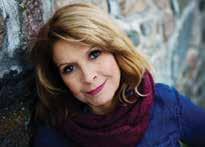
It’s hard to know what we really do. The prospect of not knowing when we might be able to do theatre again, in any kind of normal way is debilitating.” And then there’s the financial cost of the lost 2020 summer season. Ms. Blackwell says about $500,000 in potential earned revenue was “just gone … wiped out.” With the help of government assistance, administrative staff were kept on, but all theatreaffiliated artists and production people were out of work.
Despite the hardship endured, Ms. Blackwell says 4th Line will survive and thrive once more, albeit with some modifications.
“Theatre has been around for 5,000 years in the form we do it now,” she says. “It’s gone through pandemics and wars and complete world devastations, and it keeps coming back in basically the same way the Greeks did it. I could keep audiences safe and distanced tomorrow if that was allowed. What’s harder for me is wrapping my brain around how to ensure the acting company is safe when they ultimately, at some point, have to take their masks off and stand relatively close to each other.”
Ms. Blackwell envisions smaller acting companies being one possible post-COVID consequence.
“We’re so known for big casts that are a mix of professionals and community actors. That’s what makes this place so bloody special, along with the beautiful farm. The Canada Council for the Arts is really pushing a digital strategy. Does that mean, at some point, filming shows and making them available digitally for people to watch? That’s all fine and good, but at the heart of it, theatre is about that coming-together experience; a group of people sharing a communal experience. You can’t replicate that digitally.
“Getting people back here when we can, and telling amazing stories, that’s what I’m focused on. This is a long game in terms of what will be needed to bring the arts community back. The switch was turned off on March 13, 2020, and all theatres closed. The opening will be slower, and there’s going to have to be support for a long time.”
ANDREW MORRISON ’04 (The Jerry Cans) The Jerry Cans—Andrew Morrison (guitar/vocals), Gina Burgess (violin), Brendan Doherty (bass), Avery Keenainak (accordion/vocals) and Steve Rigby (drums)—combine traditional Inuit throat singing with a folk and country rock sound. With four albums to date, the band garnered national attention in 2018 via a pair of Juno Award nominations for Breakthrough Artist of the Year and Contemporary Roots Album of the Year for Inuusiq.
Not unlike many Canadian musical acts, The Jerry Cans had a full itinerary planned for 2020, including treks to Japan and Germany, as well as a summer cross-Canada tour. But when the COVID pandemic arose in March, those plans changed drastically.
“Frustrating, disappointing … those words don’t encompass how we felt,” reflects Mr. Morrison. “Music and art is a career. It’s what we do and what we are good at. It gives us self-pride, but it’s also something that’s really important for our mental health. When we feel shitty, or when we feel great, we make music. We make art. When that rug was pulled out from under us, it was very hard.
“We’re very much into audience participation. Dancing and screaming and singing and laughing with audiences is huge. I miss that so dearly. We were talking with people all over the world about this little place called Nunavut. We were sharing music, but we were also sharing stories to help shape what people understood about a place that’s often understood in a negative light or not understood at all.
“We’re lucky. There was no COVID here (in Nunavut) until recently. We played one show. We stopped and the crowd sang with us. We hadn’t done that in so long we forgot that people knew it (the song). I almost cried. There was this powerful connection.”
That connection, says Mr. Morrison, is absent from the virtual live events that many bands have pivoted to.
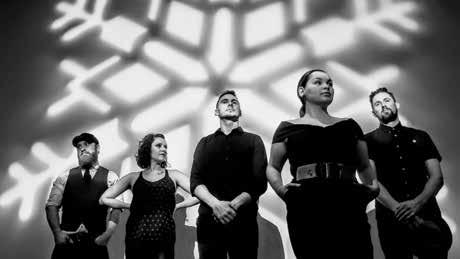
For that reason, The Jerry Cans have avoided going down that path. As Mr. Morrison notes: “It doesn’t fill the void. It’s awkward and weird. I applaud everybody doing it, because I love musicians singing their songs and expressing themselves. I think it’s one of the most beautiful human things possible, but we never got the same buzz. We also live in Nunavut and the Internet here isn’t great. That’s another barrier. So, we’re just taking time to reflect and deepen other aspects of our lives.”
To say Mr. Morrison is worried about what’s ahead for the live music industry, post-COVID, would be an understatement; an opinion rooted in his belief that “things will never be the same again.”
“I’m afraid that artists will get ripped off more … I’ve already seen that in the offers we’re getting,” he says. “I’m nervous that all the work artists have done to increase wages and fees and protect themselves is going to go down the drain because COVID will give promoters, managers, labels, everybody, an excuse to pay artists less. Managers and labels are losing money right now as well, and they’ll use COVID as an excuse to recoup some of their losses.”
Time will tell if Mr. Morrison’s prediction of tough times ahead will play out, but whatever the live music landscape looks like moving forward, he says he’s excited at the prospect of getting back to doing what he knows so well and loves so completely.
“I was always the one who, if we had a crappy sound check, would be swearing. I would give anything in the world right now to have a crappy sound check.” SPENCER J. HARRISON ’97
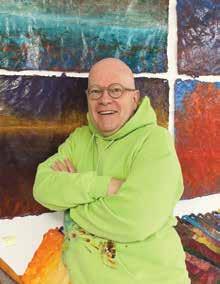
Dr. Spencer J. Harrison is an artist, activist and educator who has practiced professionally for more than 30 years. He has a master’s degree in Canadian Heritage and Development Studies from Trent and, in 2014, through the Ontario Institute for Studies in Education (OISE), became the first Ph.D. student to complete his dissertation exclusively through artwork. An instructor with the Department of Drawing and Painting at OCAD University, his work is featured in public and private collections, including the Trent University Art Collection.
Admitting to being “someone who tends to creatively overwork,” Mr. Harrison says these pandemic times haven’t created any new opportunities for him.
“I’m constantly painting, emotionally, where I am in the world,” he says. “I don’t want to make work that just talks about how difficult it is to be where we are right now. I’m a person that approaches the world as a positive place to be. I want to ensure this work is really different from the last work that I showed. I think people will come to it and see it as being different; but I think they’ll see it as incredibly positive.”
“This work” is the 70 or so paintings “in play” in his Toronto warehouse studio space. It’s what has kept him busy during the pandemic, along with teaching OCADU drawing and painting courses online, as opposed to in person.
“As an educator, teaching online means you’re going to work with different parameters, different materials, and you’re going to be able to achieve different outcomes,” says Dr. Harrison. “As a teacher, I don’t think of myself as the expert at the front of the room. I think of myself as someone who is going to facilitate helping people become more deeply involved in what they’re doing, and learn more about themselves, and make work that matters to them. There were some aspects that were lost when we weren’t face-to-face, but there were other things that happened only because the course was taught online.”
As for his art, which he says brings in two-thirds of his income, with teaching covering the rest, Dr. Harrison saw two exhibitions of his work put on hold in 2020. He says he hasn’t focused on the resulting lack of engagement with those who would typically view his work and provide their thoughts and feedback.
“If I wanted to concentrate on that, it would be really problematic. I have six friends that I send images of my work to as it’s moving along, so I still get engagement.”
That said, he admits, “an exhibition usually sends you back to your studio feeling, ‘Did I do enough? Was the work strong enough? Did people really get it?’ There’s kind of a fall that happens, right after the show opens; and then there’s the momentum of the work being seen, being appreciated, and the conversations I’ve had about it.”
COVID lockdowns, says Dr. Harrison, have made working in a studio setting complicated. For example, his primary studio, in a
Dr. Spencer J. Harrison. Photo courtesy of Dr. Spencer J. Harrison.
Toronto high school where he has been artist-in-residence for 15 years, is not an option. His studio is now in a near-empty warehouse and hasn’t been ideal at times.
“I get in my vehicle, I drive to the studio, I paint; I get in my vehicle and I go home. I come in contact with no one, and yet it has been very clear, at times, during lockdowns, that we weren’t allowed to be in studio spaces.”
Art, however, continues. No matter what.
“I do a fair bit of drawing at home. It’s never going to go into an exhibition. I’m just doing it for myself to keep honing my skills.” Another pursuit that Mr. Harrison has found time for during the latest Ontario lockdown, is writing.
Looking ahead to a post-COVID world, he’s sure he’ll emerge creatively intact, despite the challenges the past year and a bit have presented.
“I’ve been doing this for a lot of years, and there have always been a challenges,” he says. “I don’t think I’ve lost the sense of how beautiful the world is around me. I hope that people come to my work and it does something to them emotionally. I’m trying to constantly remind people of beauty and happiness and putting energy towards those positive things.”
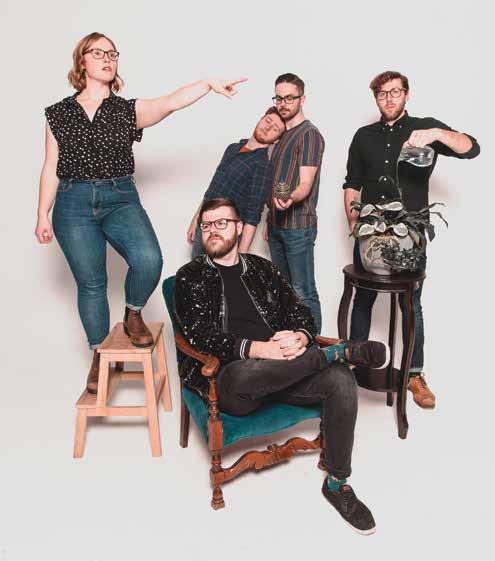
MATTHEW LAMERS ’09, MATTHEW MORGAN ’10 AND MATTHEW RAPPOLT ’11 (I, The Mountain)
Formed in 2011 by the three Matthews while attending Trent, I, the Mountain knew they had something special when, representing Otonabee College at the 2013 Intercollegiate Battle of the Bands, they finished second. The band’s debut EP Land & Sea and its follow-up Two Birds drew critical acclaim. Their unique alt folk-pop sound is heard clearly in The Boat, their 2019 single, co-written and
produced by Peterborough-based James McKenty.
I, The Mountain. Photo courtesy of Bryan Reid/I, the Mountain.
Most touring bands live for the rush of performing in front of a live audience. I, The Mountain is no exception, even if COVID has dashed hopes of returning to a club or festival stage anytime soon.
“We miss that more than anything, because that’s the thing we pride ourselves on: the interaction with the crowd, and making it a communal event. When it comes to our audiences, it’s as much their show as it is ours,” says Mr. Lamers.
But again, not unlike musicians across Canada, the band has been forced to “rethink what it means to be a band in the COVID era.”
“We miss playing live shows so much, but, in other ways, it did force us to look at other options,” notes Mr. Rappolt. “We did an amazing virtual tour last year, where we toured in different parts of Canada and even in the United States. For example, we connected with our good friend George Woodhouse in Halifax for a virtual show.”
Still, performing virtually has presented the expected challenges.
“On our virtual tour, we’d get audience feedback; but there’s a 7-to10-second delay between when you do your thing and when you hear back,” says Mr. Morgan.
“When you see that feedback, it’s like, ‘OK, that’s not for right now … it’s for a little bit ago.’ It still helped us learn what works and what doesn’t work. It’s just not as immediate.”
Like his band mates, Mr. Morgan “very much hopes to jump back into the (live) performance scene.”
“Touring will definitely come back, but I think there will always be that contingency plan. The good thing is that all of us will have gone through this once. If something were to
happen again, the shift to digital would be easier.”
Mr. Lamers concurs, noting how I, The Mountain presents its music to audiences may very well change significantly moving forward.
“We’ve asked ourselves, when live music returns, why we wouldn’t also have a live stream of our concerts, so anyone can join,” he says. “We still want to tour, and have those select communities that we play to, but the pandemic has really shifted our perspective when it comes to social media. We’ve had so much time to hone our skills and refine things. We’ve learned new skills and definitely made huge strides in other places. We don’t have to book a tour or spend time putting all these shows together. We can write a grant or write more music.”
As debilitating as the pandemic has been in terms of the band’s typically busy live performance schedule, Mr. Rappolt says there is a silver lining.
“As much as there have been real challenges, and it’s definitely changed the music industry forever, there have been some new opportunities for fans to connect with musicians and for musicians to connect with their fans,” he says. “You see musicians who are monetizing that as well. Some revenue streams have opened up that maybe didn’t exist before. We’re definitely missing the live interaction, but hopefully we’ll be able to recover that part of it while also maintaining this new community, this new connection, that we have with our fans, and make it the best of both worlds.”
Mr. Lamers adds that, when concert performances do return, “there’s going to be such uncertainty. Who’s vaccinated? Do people have to be vaccinated to go to this concert? Or people in general thinking: ‘You know what … I’m not ready to step back into that realm yet.’ I can see it being a lot cheaper for musicians to just hop online. For us, it definitely wouldn’t be as fulfilling; but, monetarily, I can see how some might stick to a more stream-heavy approach.”
MADDIE LONGO ’10 AND KIKI LONGO ’11 (Maddie & Kiki’s Grill Studio)
Oshawa born and raised sisters Maddie and Kiki Longo have made a huge name for themselves in the cultural sector as Canada’s favourite female grill masters. Since debuting on cable TV as The Foraging Sisters, the siblings have appeared on a number of nationally-televised food programs, have a weekly show on YouTube and have opened Maddie & Kiki’s Grill Studio to instruct students on the finer points of BBQ grilling.
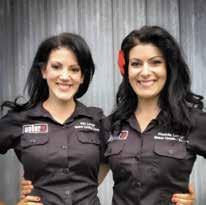
Maddie and Kiki Longo. Photo courtesy of Maddie and Kiki Longo.
The pandemic shift to online interactions wasn’t as hard for Maddie and Kiki as it was for many others. After all, virtual instruction is comfortable territory for the duo. Still, it impacted how they operate.
“Pre-pandemic, we had all kinds of live events planned,” says Maddie. “Just as with the rest of the world, everything got cancelled. We were supposed to go on a cross-Canada tour. Now our work is being done predominantly online. We actually really love it because we don’t have to lug barbecues with us all over the place. We just do it right from our backyard.”
Kiki notes their grill studio space is now being used as “a pretty deckedout grill zone to shoot our YouTube episodes. Since we’re doing more online, we’re connecting more with parts of the barbecue community from around the world. When we were doing local shows, you wouldn’t get people from, say, Germany or Australia. It’s a different connection now.”
Not hurting matters for Kiki and Maddie is the fact that online presentations have always played a huge role in their instructional approach.
“We just really, really try our best to not think that we’re talking to a screen ... that we’re actually talking to our friends out there,” says Maddie. “If you think of it like that, it feels like you’re actually hanging out.
“A lot of people have tried to regroup and do things differently. In a lot of ways, we’re sometimes finding things we did in the past were harder. Now, it’s easier. We can connect with people like this more often.”
Still, despite the smooth transition to going exclusively virtual, Kiki notes there were plans in the works that have been put on hold due to ongoing COVID restrictions.
“We had a long-term plan for what we wanted to accomplish, what we wanted to do, where we saw our career heading and it completely took a right turn,” she says.
“If anything,” continues Maddie, “the pandemic has taught us that none of us should be looking that far into the future. We don’t go past three months. We’re trying to live in the moment more, and enjoy what’s happening right now, because who the heck knows what’s going to happen in the future?”
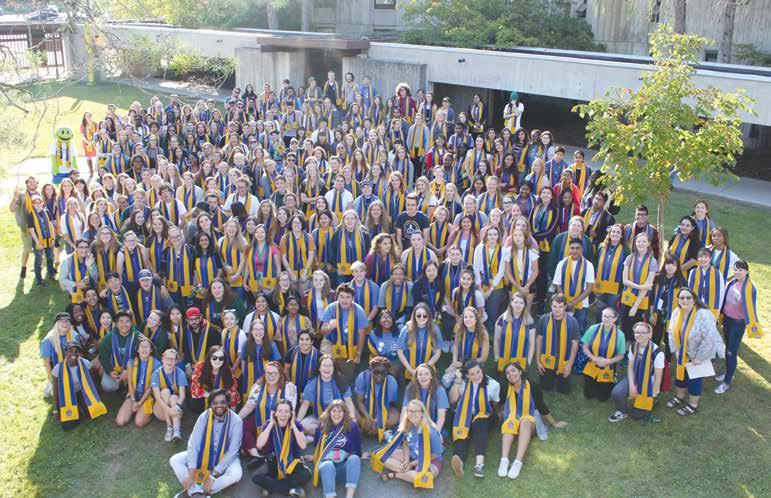
Two Easy Steps to Rekindle Your Connection to Lady Eaton College
Did you know there are over 8,000 Trent alumni affiliated with Lady Eaton College (LEC)? Our LEC alumni are making big strides and giving back, wherever it is they call home today. You can stay in touch with this extraordinary community in two easy steps. Step one: subscribe to their new e-newsletter, The Drumline: Alumni Edition. Published two to three times a year, the newsletter includes pertinent updates from your beloved college, as well as stories and achievements from fellow alum. Step two: join their alumni Facebook group! They have members spanning across the decades and disciplines. Join today to connect with fellow alum, hear from the College, and reminisce over old photos and videos of life at LEC and Trent University.










